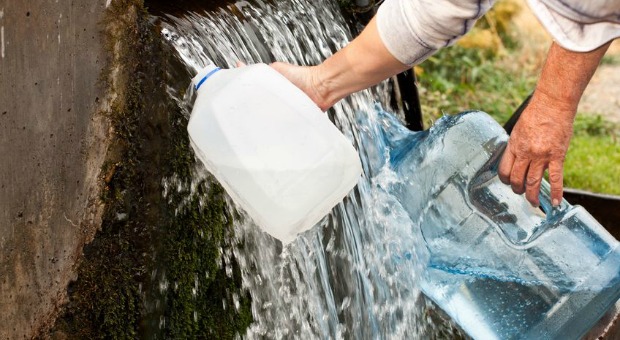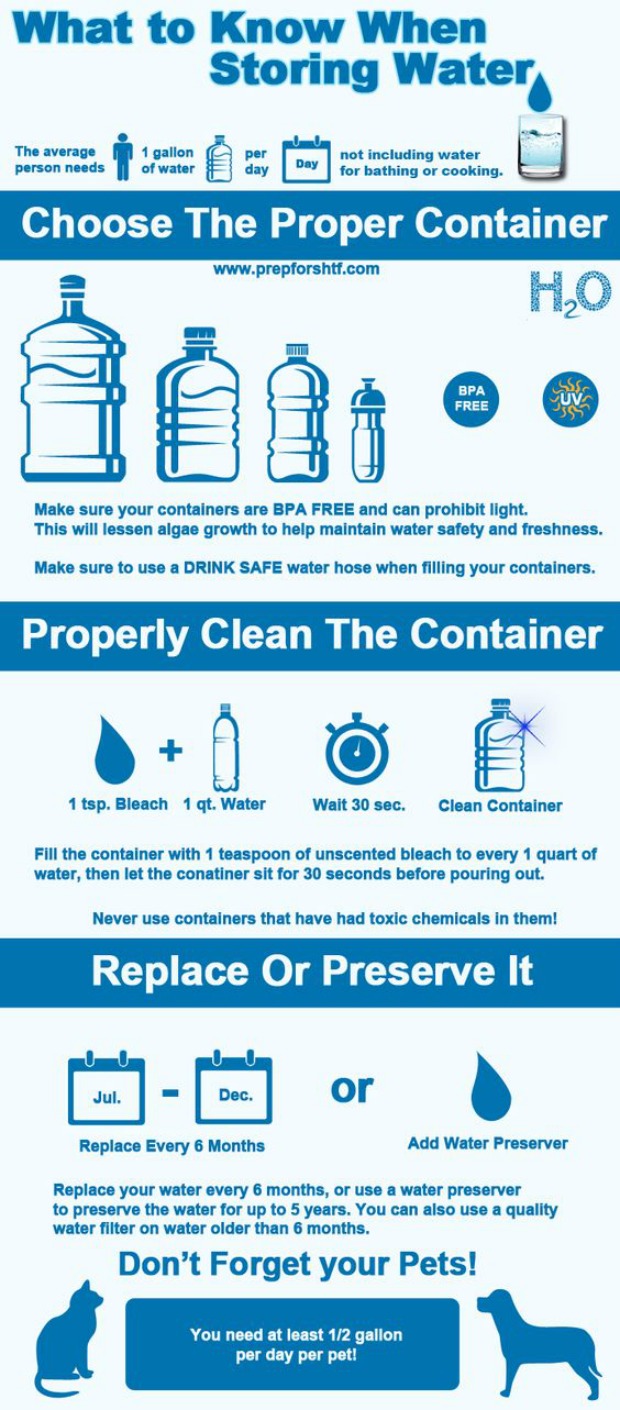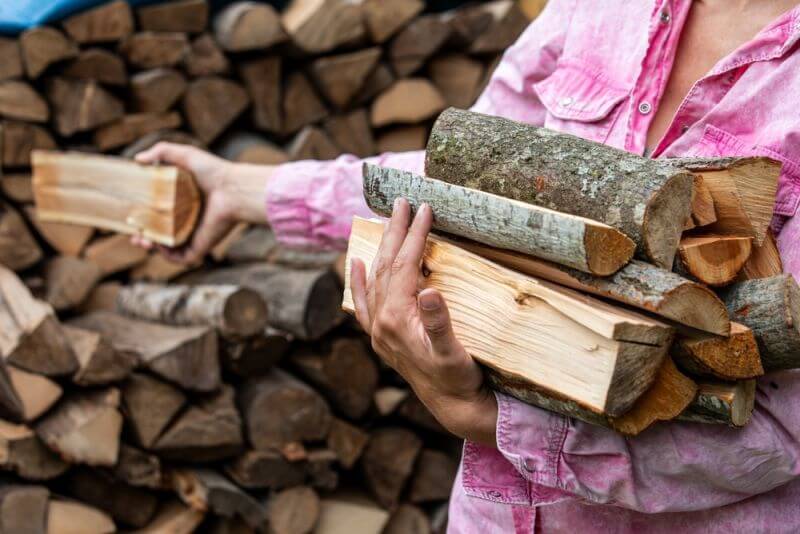One of the things that we as preppers and homesteaders are most proud of is using what we have on hand. If everybody operated like we did, there would be a lot less waste on the planet, and a lot more creativity. We re-use and repurpose so many items that we’ve taken it to an art form, so why not do the same with our water storage containers?
Sure, you can buy the fancy water containers at your local Walmart or Target, but they’re expensive and you’re not much bang for your buck. Why not reuse something that you’ve already paid for and are just going to throw away anyway?
What NOT to reuse as water storage containers
There are some things that you just shouldn’t use as water containers either because they’re not suited for it, or they can kill you. Neither situation is ideal, and we’re talking about storing something that is non-negotiable in terms of survival. You absolutely cannot live without a ready supply of clean water regardless of the season.
Food Grade Only
So, first on the list are porous containers that held toxic materials such as oil bottles, antifreeze jugs, and kerosene oil bottles. This may seem obvious to you, but believe it or not, there are cases of people who have reused these types of containers, much to their detriment. Use only food-grade plastic that has only stored food. So, enough said. Use your common sense.
Milk Jugs
Next on the list are milk jugs. I know – many people use milk jugs to store water, and they’re great for short-term storage in the fridge or freezer, but not for long-term storage. They’re relatively flimsy and easy to puncture or damage, especially if they’re warm or frozen, and the lids aren’t particularly tight on many of them.
You may use them for a couple of years, then come to check your stockpile and notice that one was punctured by a nail head or something when you scooted it across the shelf the last time you moved something, or the lid popped loose. Now you have water on the floor or shelf and it may have ruined some of your stuff. At the very least, it made a mess.
Plastic with BPA
Don’t use plastics that have BPA in them. BPA, or bisphenol A, is an industrial chemical that has been used for decades to add strength and resilience to plastic and to line cans and packaged food containers to prevent leakage and rust.
Unfortunately, it leeches out into the food or drink and binds to estrogen receptors and interacts with other hormones. This can disrupt body functions such as cell repair, growth, energy levels, metabolism, fetal development, and body temperature regulation among many others. In other words, you may not want to drink it.
Because of the controversy, many companies, especially ones that produce bottles and jugs meant to hold liquid, are shying away from BPA. Just check to make sure that your container is BPA free. It will either say it, or the little recycle triangle will have a 1,2, 4, or 5 in it. These are free of BPA and other harmful chemicals, but avoid containers marked with a 1. We’ll discuss that in a minute.
Now that we have our list of containers NOT to use, let’s talk about ones that are good to use to store water for long-term water storage.
Our forefathers used different methods to store their water when they settled with their entire family in new areas.
This long forgotten water storage secret can save your life!
Good containers to reuse for water storage
Thankfully, this list is long and most of them are already in your refrigerator or cabinets.
How to distinguish food-grade plastics
As long as the little recycling number has a 2 (HDPE – high-density polyethylene), a 4 (LDPE – low-density polyethylene) or a 5 (PP – polypropylene), you’re good. It’s not a good idea to reuse containers marked with 1 (PETE – polyethylene terephthalate) because detergents and heat will break it down and can cause antimony, a toxic chemical, to leech into your water. So, use only plastic containers that have a 2, 4, or 5 in the triangle.
A tip about reusing plastic for water storage: wash it in the dishwasher or in warm, soapy water, rinsing well, and allow to air-dry.
Juice jugs
These are great containers to reuse to store water because the plastic is usually thick and juice is pretty easy to wash out of the jug. The lids are usually secure, too. Since the plastic is usually sturdy, you don’t run the risk of tearing it by snagging it on a nail head or breaking it if you bump a corner when you’re moving it.
Some people will tell you that you can’t get all of the sugars out of the bottle and that can lead to a breeding ground of bacteria, but if you use chlorinated water or add a few drops (2 drops per quart) of bleach, you should be fine.
Juice jugs come in many different sizes, from small, single-serving bottles to gallon (or bigger) jugs. All of them are good for storing water, and it’s a good idea to have water stored in smaller containers so that you can take it with you if you have to flee. Also, if you have all of your water stored outside in drums, people will see them. You want to keep your water supply hidden.
5-gallon buckets
Ahhh… yet another use for 5-gallon buckets. Personally, I like the idea of storing water in these because they’re stackable, they’re typically made to contain liquids (think pickle juice), and they’re opaque. They meet all of my needs except portability, but won’t it be nice to have a few gallons of water if you need to make a huge pot of soup to feed everybody?
As with all plastics, make sure that they’re food-grade because not all of them are. Though you can buy these, there’s really no need to because you can go to restaurants, bakeries, grocery stores, and just about anywhere else that sells food and get them for free.
If they happen to smell like pickle juice, wash them well and fill them with water, then add half a cup of bleach to it and let it sit overnight. Charcoal and vinegar work too, but I don’t like to add vinegar on these because then it smells like vinegar, which is suspiciously similar to pickles. You can always just take off the lid and let it air out for a few days, too. Sometimes that works and sometimes it doesn’t.
Soda Bottles and water bottles
Soda (aka pop) bottles are great for water storage. Since they come in many different sizes from 8 ounces on up to 2-liters, you have a lot of versatility. Many water bottles are reusable, too. As with all other plastics, clean well with warm, soapy water and rinse thoroughly.
55-gallon drums
If you want to store large quantities at a time, then these are a great option. Again, just make sure they’re food-grade and haven’t had any non-food products stored in them.
If you want to buy them new, just search the net for them. You may even be able to get them for free if you live near a soda distribution plant because that’s what they buy their syrups in. If they have a policy against giving them away, ask who picks them up, then contact that company. Chances are good you’ll get them for just a few bucks a piece.
Oh, and these come in both plastic and stainless steel, so you have options. I’ve never used the stainless steel ones so I’m not sure how heavy or unwieldy they are compared to their plastic counterparts. On a similar note, you can make a collection, storage, and filtration system using 55-gallon drums.
Now that you have some ideas for reusing containers for water storage, what are you waiting for? Start storing.
Remember the Law of Three: you can survive without water only three days. Click the banner below to discover our ancestor’s methods of water storage!










mike | February 27, 2017
|
I keep used juice and gallon water bottles. They are stored, dry, in cardboard boxes. The boxes are marked. As long as we have an hour notice, we can fill 50 gallons quickly. If we have to bug out, we can fill some and take the rest.
JJ | February 27, 2017
|
I really dislike articles suggesting discarding water after 6 months..like you are forgetting water is good indefinitely if you plan to use it in a Berkey.
I have water stored in 30gallon drums since summer of 2011 with NO preserver at all.
It would be reckless of me to pour out 600 gallons of water every 6 months and refill these drums, not discounting the time and trouble.
Please stop suggesting discarding water every 6 months.
I have about 100 gallons in juice jugs, bleach jugs, windex jugs stored for years that I plan to use for cleaning, etc, and using in a Berkey(stored in juice jugs) for drinking.
And, no, I do not use milk jugs for water storage for any length of time.
Paul | March 1, 2017
|
I agree with JJ. I have containers that I’ve had for 15 – 20 years with water and the water is still crystal clear and tastes good. I would recommend, however, that it is a good practice to filter all water you drink with a good filter such as a Berkey filter. Also, why would anyone in their right mind through away water that could be safely used to wash clothes or even to take a sponge bath in?
JEanne | October 21, 2017
|
I would like to store water for a long time without using any harmful chemicals. I purify my water before storing in 5 gallon containers. I have noticed that if it sits around for a long time, there is black slime in it. i don’t want to use chlorine, and want something natural to add to the jugs. I would not want to drink this water if i know there is something growing in it.
Digimedes | February 22, 2023
|
I know this is old, but hopefully someone seeing it might find it useful.
One old-school method of helping keep water fresh, especially when chemicals aren’t handy, is to use silver. It’s a natural disinfectant, and while not the strongest, can help water stay fresh for longer. Simply drop a (sterilized) silver dollar or two into each container before sealing it. Should extend shelf life noticeably (and hey, it’s not a bad place to hide a small amount of wealth.)
Pingback:How To Store Tap Water For Survival | Survivopedia | February 12, 2018
|
Gayle S | April 30, 2018
|
Try hydrogen peroxide: 9 drops per liter or about 34 drops per gal, I believe. Has been awhile.
Frank Vazquez | April 29, 2018
|
I would like to create a rain water collection and storage system and maybe even one from the water pump or from the house. I feel it’s too much of an inconvenience and a weak plan to run around trying to fill containers with water prior to a coming hurricane. And of course if things were to get really bad, well then a large and long term supply will be needed,
I live in Orlando and hate the heat and humidity, but I see the practicality and need to take advantage of the resources this climate and region offers. And I have experienced hurricanes which mostly result in a loss of power plus the regular 2-3 power outages that occur every year. Not being prepared with water and even temporary backup power and a way to cook or cool off will leave you miserable and it’s not necessary to suffer the full extent of the problems caused when a good supply of just water can make you more comfortable.
Frank Vazquez | April 29, 2018
|
Good article by the way, I much appreciate the infographic and all the information so I know what containers and types of plastic to use for water storage. You made it very clear what is and is not suitable.
Bruce Stringer | October 29, 2018
|
Helpful. I have about a dozen 4 liter jugs that held Carlo Rossi wine. They were cleaned with hot water and rinsed with reverse osmosis filtered water and then filled with same. The water remains stored in my basement and is crystal clear. We’ve had occasion to use a few as a result of water main breaks. 5+ year old water was crystal clear and fresh tasting .
Lynne Clark | August 28, 2020
|
Nice article. But I am wondering about reusing gallon vinegar bottles for water storage. They are thicker than water bottles, therefore safer. IMHO
JJ | May 28, 2021
|
What about HDPE containers that contained laundry soap (Free and Clear)? They have a convenient spout. Good for water for washing up, what about drinking?
susan | August 6, 2021
|
I have 3 gallon white #2 jugs…I’d like to use to store short term regular gas in….anybody know if this would work?